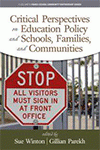
Critical Perspectives on Education Policy and Schools, Families, and Communities
Edited by:
Sue Winton, York University
Gillian Parekh, York University
A volume in the series: Family School Community Partnership Issues. Editor(s): Diana Hiatt-Michael, Pepperdine University.
Published 2020
Critical Perspectives on Education Policy and Schools, Families, and Communities offers scholars, students, and practitioners important new knowledge about how current policies impact families, schools, and community partnerships. The book’s authors share a critical orientation towards policy and policy research and invite readers to think differently about what policy is, who policymakers are, and what policy can achieve. Their chapters discuss findings from research grounded in diverse theories, including institutional ethnography, critical disability theory, and critical race theory. The authors encourage scholars of family, school, and community partnerships to ask who benefits from policies (and who loses) and how proposed reforms maintain or disrupt existing relations of power.
The chapters present original research on a broad range of policies at the local, state/provincial, and national levels in Canada and the USA. Some authors look closely at the enactment of specific district policies, including a school district’s language translation policy and a policy to create local advisory bodies as part of decentralization efforts. Other chapters reveal the often unacknowledged yet necessary work parents do to meet their children’s needs and enable schools to operate. A few chapters focus on challenges and paradoxes of including families and community members in policymaking processes, including a case where parents demonstrated a preference for a policy that research demonstrates can be detrimental to their children’s future education opportunities. Another set of chapters emphasizes the centrality of policy texts and how language influences the educational experiences and engagement of students and their families. Each chapter concludes with a discussion of implications of the research for educators, families, and other community partners.
CONTENTS
Introduction, Sue Winton. In/Exclusive Engagement of School Communities Through School District Decentralization, Sarah Diem, Laura G. Browning, and Carrie Sampson. YPAR as Policy Production: Youth Building Relationships With Home, School, and Community to Mobilize Change, Cristina Guerrero. To Interpret or Not to Interpret? That is the Question for Refugee Mentors in Schools, Jill Koyama and Linsay DeMartino. Radically Rethinking School Choice With Youths, Ee-Seul Yoon. Leaders of Color Navigating Policy in Diversifying Schools, Ain A. Grooms and Dong Hoon Shin. Responsible for Normal: The Contradictory Work of Families, Kathryn Underwood, Kathryn Church, and Tricia van Rhijn. Parent Fundraising in Toronto Schools: Coordinating Policy Layers, Sue Winton. How Inclusive Do We Really Want to Be? A Critical Exploration of the Toronto District School Board’s Special and Inclusive Education Policies and Outcomes, Gillian Parekh. Applying Critical Race Theory to District-Level Behavior Policy: Empty Promises, Erica E. Young. The (Un)Intended Consequences of Equity-Minded Educational Policy on Family and Community Engagement, Vidya Shah. Parent/Caregiver Involvement in Schools: Rhetoric Versus Reality, Michelle D. Young and Bradley W. Carpenter. The Implications of News Media Discourse About Immigrants and Immigration Policy for School–Family Engagement, Ruth M. López.
-
Paperback978-1-64113-879-6
Web price: $45.04 (Reg. 52.99)
-
Hardcover978-1-64113-880-2
Web price: $80.74 (Reg. 94.99)
- eBook978-1-64113-881-9

- EDU022000 - EDUCATION: Parent Participation
- EDU034000 - EDUCATION: EDUCATIONAL POLICY & REFORM: General
- EDU011000 - EDUCATION: Evaluation & Assessment
-
 Composing Storylines of Possibilities
Immigrant and Refugee Families Navigating School
Composing Storylines of Possibilities
Immigrant and Refugee Families Navigating School
-
 Family and Community Partnerships
Promising Practices for Teachers and Teacher Educators
Family and Community Partnerships
Promising Practices for Teachers and Teacher Educators
-
 Family Involvement in Faith-Based Schools
Family Involvement in Faith-Based Schools
-
 Promising Practices for Engaging Families in Literacy
Promising Practices for Engaging Families in Literacy
-
 Promising Practices for Engaging Families in STEM Learning
Promising Practices for Engaging Families in STEM Learning
-
 Promising Practices To Empower Culturally And Linguistically Diverse Families Of Children With Disabilities
Promising Practices To Empower Culturally And Linguistically Diverse Families Of Children With Disabilities
-
 The Power of Community Engagement for Educational Change
The Power of Community Engagement for Educational Change

